Champion’s Mojo Podcast: Jason Lezak Discusses Overcoming Negativity
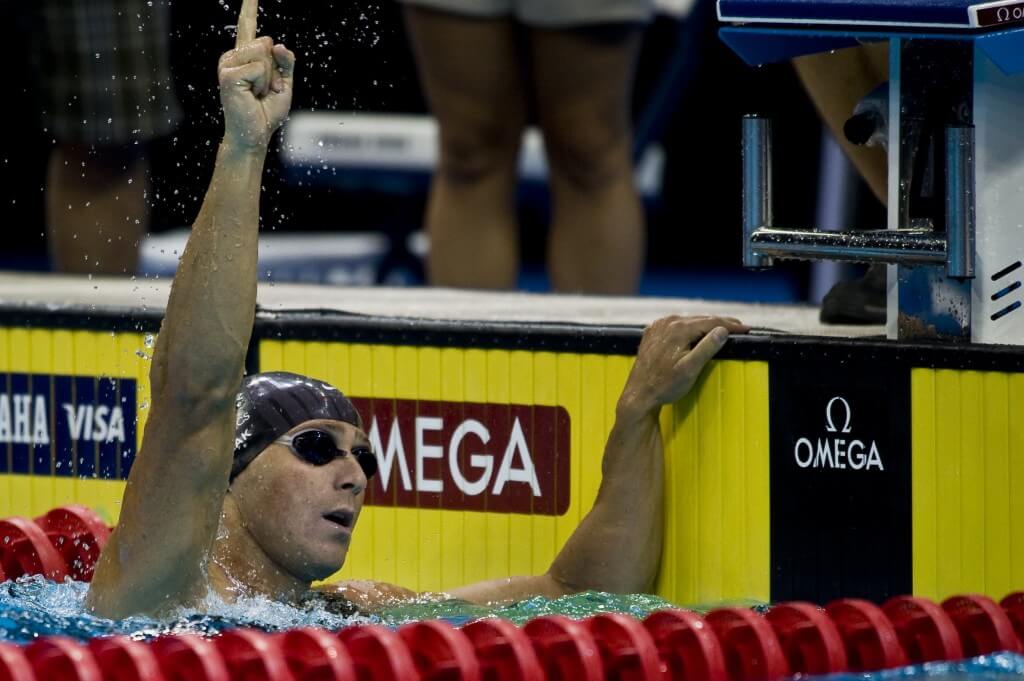
A four-time Olympian and current world record holder, Jason Lezak knows just how important it is to believe in oneself no matter the situation. Lezak is an eight-time Olympic medalist who now serves as the General Manager of the Cali Condors of the ISL. In this in-depth interview, he joins the Champion’s Mojo podcast to discuss his swimming career, how he was able to stay motivated and learn throughout his career, and his famous relay swim from the 2008 Olympics, where he ran down the then world-record holder Alain Bernard to help Team USA win gold in the 400 freestyle relay.
Below is an abridged Q&A of the Lezak interview, conducted by Champion’s Mojo hosts Kelly Palace and Maria Parker. You can listen to the full podcast, episode #73, at https://championsmojo.com or by clicking here.
Champion’s Mojo: Twelve years later, what are your thoughts on that relay at the 2008 Olympics?
Jason Lezak: Well, it was just another race. I’m just joking. Going into that race, the disappointment in the past was the motivation. I still get goosebumps when I watch that race. I’m not really watching it so much as I’m thinking I’m swimming in it. I train myself to be able to compete at my highest level and I was able to accomplish that and learn from that. There were a lot of people that didn’t think I should be there or they thought I should retire. The one thing that I continued to do leading up to that was having that belief in myself and continuing to learn how to get better. At 32 years old, when a lot of people would tell you in the sport of swimming that I was too old, I wasn’t listening to that. I was continuing to focus on improving and helping Team USA bring the gold back. Obviously you can look at it as the old cliche, never give up. I could have given up plenty of times in those four years leading up to those Olympics and I could have given up in that moment.
Champion’s Mojo: Can you share a story you have heard of how that relay has helped inspire other people?
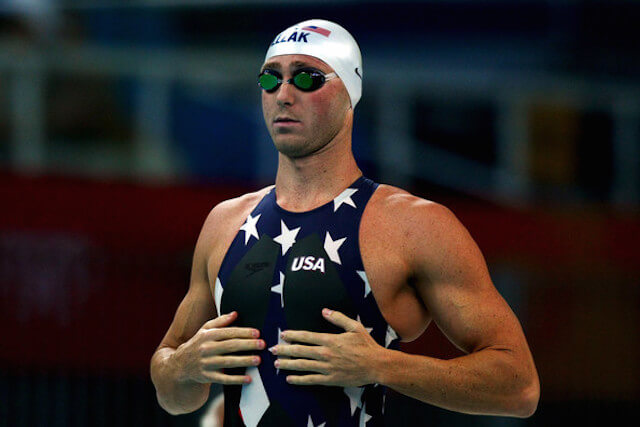 Jason Lezak: A lot of the stories I have heard were about what people were doing and what it meant to their families, whether they were former swimmers or didn’t know anything about swimming and how it brought joy to them and to the United States. I think that’s part of the reason we were able to win that race, at least for myself. It wasn’t just about winning a race that we had lost, it was about winning a race that we had lost for the USA. For me, it was a huge picture. To hear some of those stories about what it meant to be an American and watch that and feel the joy and the pride and things like that, those are some of the great stories. I heard there was somebody who was on a JetBlue flight and they were watching it live. The whole airplane went crazy. Little stories like that. Not quite the same kind of inspiration, but just hearing certain things like that over and over. It really made me understand how big that moment was.
Jason Lezak: A lot of the stories I have heard were about what people were doing and what it meant to their families, whether they were former swimmers or didn’t know anything about swimming and how it brought joy to them and to the United States. I think that’s part of the reason we were able to win that race, at least for myself. It wasn’t just about winning a race that we had lost, it was about winning a race that we had lost for the USA. For me, it was a huge picture. To hear some of those stories about what it meant to be an American and watch that and feel the joy and the pride and things like that, those are some of the great stories. I heard there was somebody who was on a JetBlue flight and they were watching it live. The whole airplane went crazy. Little stories like that. Not quite the same kind of inspiration, but just hearing certain things like that over and over. It really made me understand how big that moment was.
Champion’s Mojo: What trait do you have that allowed you to be able to train alone, without a coach, going into 2008 as the older guy and still succeed?
Jason Lezak: I think I am probably one of the most competitive people in the world. I always want to win and figure out what I have to do to make it to the point where I have a chance. I think everybody needs a coach. Early on in my career I wasn’t doing what it takes. I wasn’t listening to my coach and I wasn’t ready to coach myself. I didn’t have the knowledge that I needed. Once I got older I had learned so much from so many people that I took all these different things and then molded it into my own. I actually took myself accountable and there was nobody there to tell me to go hard. There was no one there to tell me that I finished these sets or do this. I knew that I had to do these certain things to be successful. If I didn’t do it, I wasn’t going to achieve what I was setting out to achieve. There were plenty of days when it got really hard and I felt like jumping out of the water or I felt like I didn’t even want to get in on that certain day. All I really had to do was remind myself what I was trying to accomplish and I jumped in that water or I finished that set and worked even harder. I think having a goal is important, but being able to follow through to do what it takes to achieve that goal is even more important. When I was younger in my career, I wasn’t always willing to do that. I wasn’t always willing to listen to what the coach had to say and believe in it. So I took responsibility. I believed in what I was trying to do, and then I followed through on it.
Champion’s Mojo: Is there something that you used that drove you? Was it trying to prove people wrong?
Jason Lezak: I was never trying to prove anyone wrong. I was trying to prove myself right. I was trying to do what I knew I needed to do. When I was younger, I didn’t have a clue. I just thought I knew. I learned so much through the course of my career, through so many great coaches. I was able to pull those together and make the right formula for me.
Champion’s Mojo: Can you give us an example of a story?
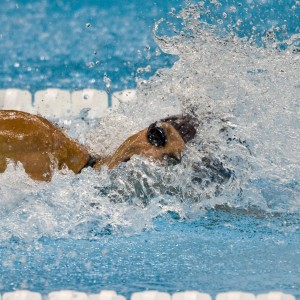
Photo Courtesy: Peter H. Bick
Jason Lezak: I think a lot of people know my college story of getting kicked off the team. It was just at that point. I wasn’t willing to do certain things. Being a sprinter in my mind meant sprinting and, to me, doing middle distance training wasn’t sprinting. That wasn’t going to help me in my mind. I know now it does help and it helps finish the 100 freestyle, which is a very tough endurance race as well as a sprint. You can’t finish the 100 with only speed. You have to be able to bring it home too. But, at that time, I thought I knew everything.
Champion’s Mojo: There’s a photo of you going into the turn next to France where you have your fingers spread wide open. Is that how you swim?
Jason Lezak: When I was little everyone told you that you needed to close your fingers and swim. It was never comfortable for me. I didn’t think it was the right way to do it if it wasn’t comfortable. Over the course of my career, I just kind of let my hand be there nice and relaxed. It felt good. I felt like I was catching water and grabbing water. People had tried to change that many, many times in my career and I never changed it. If you actually look at some of the great swimmers now, I would say there’s quite a few of them that have open hands. Maybe not to the extent of mine, but there’s a lot more open fingers now than back in the day when I was doing this. It’s something that I love and I think you can apply that to almost any sport where a feel is important.
Champion’s Mojo: So you’re very confident in yourself. Have you used that in other aspects of your life?
Jason Lezak: Trusting yourself is important. I tend to be a negative type of person so there’s always negative thoughts in my head. I’ve talked about that on that relay, but in my life as a whole as well. I really have to talk over those thoughts with these positive things, with that belief in myself to be able to get through those. I learned that the sooner you can do that, the easier it is to get over what you’re trying to get over.
Champion’s Mojo: So you’re intentional about turning those negative thoughts into something positive?
Jason Lezak: Yeah. I had to learn that myself, just based on my history and during practice or whatever it may be, or even out of competition. If you ask some old friends on the national team, the first time I had to go somewhere and I’m looking at climbing 100 flights of stairs right before competing. I had to learn to get over that because everyone’s in the same position and remember to not put the worry on that and focus on something else.
Champion’s Mojo: How do you turn those negative thoughts around on a daily basis?
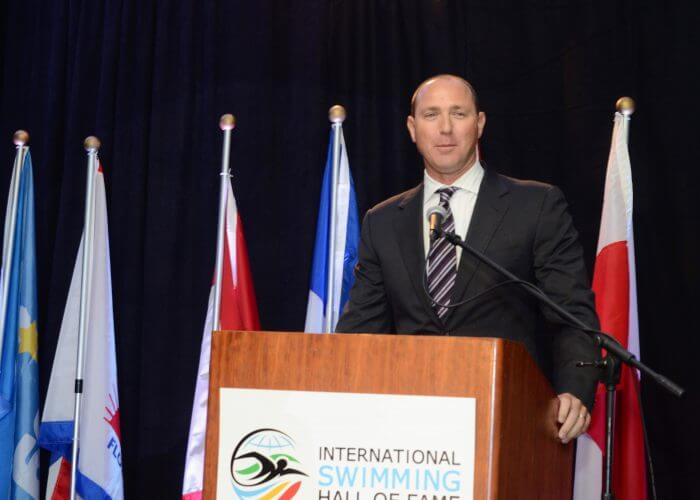
Jason Lezak; Photo Courtesy: JM STREINER
Jason Lezak: It’s constant positive self talk. That’s basically what I have to do. You have to do something and practice when it doesn’t mean anything to be able to do it at the most critical point in your life. For example, on that relay, I was able to talk over those negative thoughts because I had practice. There was no way that’s going to happen for the first time at the Olympics. It’s the same thing on a day to day basis. Even if it’s a little thing, it’s preparing you for something big down the road.
Champion’s Mojo: So you’re diving in behind Alain Bernard. He’s a world record holder in that particular event. Were you just in the zone and not thinking because you were a negative thinker or did you actually say the words in your head?
Jason Lezak: I definitely had that thought that I wasn’t going to catch him. The very first thought I had was I left early and disqualified Team USA. My relay start was so good. Throughout my career I had a great relay start. I think my average would be about .15 seconds. At the national level, that’s really good. You’re not pushing it, but you’re also not too slow. My reaction this time was .03 seconds. For me, over a tenth of second different from my normal start, I felt like I had left early and disqualified the team. Once that happened, I had to start focusing on my race and get those thoughts out of my head which I was able to do real quick. Then I got to the wall and I flipped and saw he had increased his lead on me. That was when the thought was, there’s absolutely no way I’m gonna catch this guy. He’s a world record holder.
Champion’s Mojo: How were you able to replace a thought like that during the race?
Jason Lezak: I was pretty lucky because I really felt good at that moment.I wasn’t even lying to myself and I was just telling myself it’s OK. I feel really good. Just swim your own race because I couldn’t control what he was doing. I can only control myself. The way that I did feel in the water was a pretty spectacular feeling after going out 21.5 for the first 50. It didn’t feel like I had already swam the first 50. I knew I was in a good place, but I just had to shift the focus to me.
Champion’s Mojo: After you finished, what was the first thought to go through your head?
Jason Lezak: There was a lot of joy after being a part of two losing relays at the last two Olympic Games where we were supposed to win. Growing up, Team USA dominated this race. We had never lost before my first Olympics. It wasn’t just about winning a gold medal, it was about what was behind that gold medal and the climb out of the water and grabbing my teammates. That was pretty important to me because I knew that this wasn’t a one person race. I was the team captain. I gathered them together before the race and I told them this wasn’t a four by one hundred freestyle relay. This is a four hundred. Let’s go out and swim it together. We all knew that there wasn’t one person going to win this race. We all four had to step up and go beyond what people thought we were capable of on that day. That’s what we did.
Champion’s Mojo: That relay was also important in keeping Phelps’s chances at winning eight gold medals alive. Do you believe that the power of intention and the energy of that helped him in his 100 fly and you anchoring that relay?
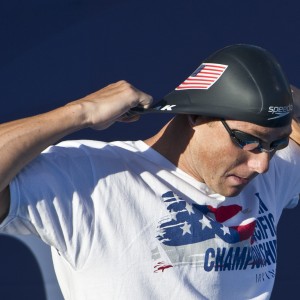
Photo Courtesy: Peter H.Bick
Jason Lezak: I feel like everything had to line up for him and it did. There were a lot of races where things could have gone wrong and they just didn’t. I think the stars all lined up for Michael and it took three efforts from his team and five individual ones. He did something that probably will never happen again. It was spectacular to be a part of that.
Champion’s Mojo: What are you up to lately during quarantine?
Jason Lezak: I know it’s been tough for everybody out there. As far as the quarantine goes, besides being the General Manager of the Cali Condors, I’ve been doing swim clinics across the country for the last 20 years, but really eight years full time since I retired. That’s been on hold, which has been really tough because I really enjoy seeing the kids and being able to go out there and share my experiences and share my stories with them. Getting in the water to show some things that I’ve done. Share the gold medal with them. I’ve been on Zoom calls with plenty of teams, which has been great, but having that personal contact is also something that it’s been tough not to be able to do. Being at home and spending more time with the family, that’s great. The kids are out of school now. I still have to work during the day, but we do make time to be able to do certain things that we might not be able to do with me traveling as much as I traveled in the past. I haven’t been on an airplane in over three months now, which is a record for me. I guess that’s the positive out of the pandemic. Working with the ISL has been great. We’re developing and I can’t announce it yet, but I have a really good plan of what’s going to happen to try to make these athletes as safe as possible, to be able to go out there and compete and have a season and actually do something that they love. The Olympics were canceled. The World Championships were canceled. There’s really nothing for them this year except the ISL. I think all the athletes are really excited about it. My team that I put together, which will be announced very soon too, is really good. Last year we had a great team and came in third place and I really believe we have even a better team this year. It’s going to be a lot of fun for me to be a part of this again. This is a revolution of swimming and we’re looking forward to giving these professional athletes a chance to actually make a living out of it and really call themselves professionals. It was something that I wish I could have done when I was competing. I love to race. As I mentioned, I’m very competitive and the more races I could get in, the better it was for me. Something like this would’ve been great. Now I get to give back to the younger generation and they’ll be a part of that and building the Cali Condors is the best I can do to help the league really be successful.
Champion’s Mojo: What is one thing you learned from your career that has helped you in life?
Jason Lezak: I think one of the things that I’d take away from swimming is my ability to learn. If you look at my career, I didn’t always achieve what I set out for. There were plenty of times where I failed or was setback. I always came back from that and thought, OK, what do I do better next time? How do I make things different? It’s the same thing. I’ve made plenty of mistakes, especially in a startup like the ISL. This is brand new and it’s a learning curve. So make those mistakes. Know you made a mistake. Figure out how to do better next time and move on. There was a time when I would look at a mistake and think about it for a year and it didn’t get better. You have to be able to figure out how to put it in the past, move forward, and do better next time.
Champion’s Mojo: What was the biggest obstacle you overcame in life?
Jason Lezak: It depends if you’re looking long term or short term. Look at that race. That was a pretty big obstacle. I was six tenths of a second behind the fastest person to ever swim that race in history. To try to beat him in that race and come back for Team USA, that was that was a pretty big obstacle. I’ve had plenty of things as far as if you want to talk about injuries or, you know, those setbacks. Setbacks like in 2004. Coming in 21st place in the 100 freestyle by making a tactical mistake and swimming too easy in the preliminaries. That was a pretty big obstacle to come back from at 32 when nobody believed me to do that.
Champion’s Mojo: What moment do you look at as one of the most discouraging in your life?
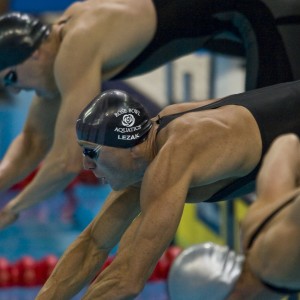
Photo Courtesy: Peter H. Bick
Jason Lezak: If you see the look on my face from that race in 2004, you could just see the discouragement in my face and to see that board and see I didn’t make the top sixteen.
Champion’s Mojo: Are there any traits you find to be common among successful champions?
Jason Lezak: I would say all are extreme competitors. A lot of them are having a great time having fun, joking around with their friends, but then when you see them get ready to swim, you see this fierce competitiveness in them. I think that’s something. And, as I mentioned before, having that belief. That was one of the things that really set me apart as an athlete was that I didn’t care what anybody else said. I was listening to myself and I was believing in myself. I think with a lot of these guys can see that sense of confidence and that belief that they have to be able to go out there and do what they’re supposed to do. I think the desire to win is really pretty important. You could put eight people in a race. Every one of them have done the exact same thing to get to that point. They’re all standing on the blocks. I think the person that wants it the most is the person that’s going to win. You see a lot of the true champions have that kind of desire. That’s something you can’t teach. It ties a little bit in with that competitiveness.
Champion’s Mojo: Could it be more the desire not to lose instead of the will to win?
Jason Lezak: With me, that wasn’t the case. I’ve talked to so many people that have said that. I can see that point, but for me it was more about winning than not losing.
Champion’s Mojo: Regarding being driven by wanting to win more or wanting not to lose more, what are your thoughts?
Jason Lezak: You look at somebody like Michael Phelps with all the success he’s had he still has had a couple of times in his career where he didn’t achieve certain things. No matter who you are, you are going to have to overcome or make a comeback from a setback. You have to learn how to do that. For me, it happened a lot more than other people. I think to be a champion, you have to learn from those mistakes. From a young age, I think before even video analysis became popular, I was already watching videos and trying to figure out what other people were doing and things that I can do differently to get faster and things like that. Always wanting to learn. I think there’s people out there that have a ton of talent. There’s people out there that work really hard. You have to put the whole thing together. It’s not just one or two components. I think that the learning process right there is pretty important.
Champion’s Mojo: Is there anything else we haven’t talked about?
Jason Lezak: I think probably one of the most important things is believing in yourself and not focusing on what other people believe. I didn’t say this earlier, but I’ll give you a little story. When I was just a young kid, I was actually one of the fastest in the country when I was 10 years old. I went through a tough time where everybody was passing me up. I wasn’t necessarily loving the sport as much anymore. I’m 14 years old and just one of the average swimmers and one of the parents of a kid on the team said to me, “Jason you used to be so fast. What happened to you?” It was at that point when I thought, wow, nobody nobody believes in me. Nobody thinks I can do this. That maybe motivated me a little bit to get back in and start doing what it takes. I think having motivation is important.You have to believe in the process. You have to believe in everything along the way to get there. I think coaches are really important. I was able to do it on my own, but I did take all these things I learned from all my coaches. I didn’t just make up something to become successful. Being a student in the game, believing in yourself, having that desire, being competitive. Those are the things that it takes to make it happen.
Champion’s Mojo: Thank you for spending this time with us today!
Jason Lezak: My pleasure, thank you for having me!



